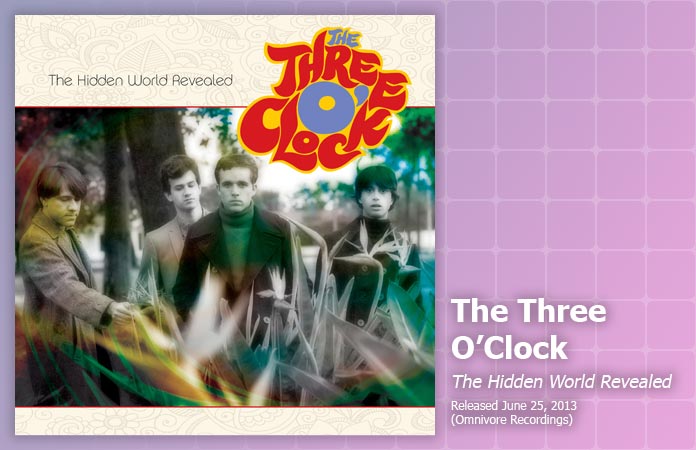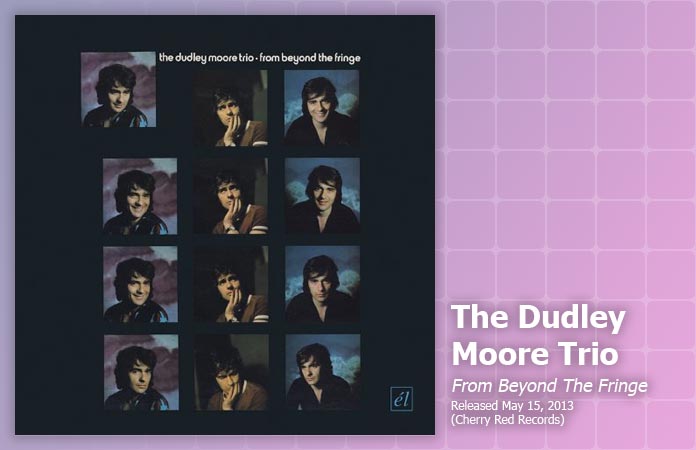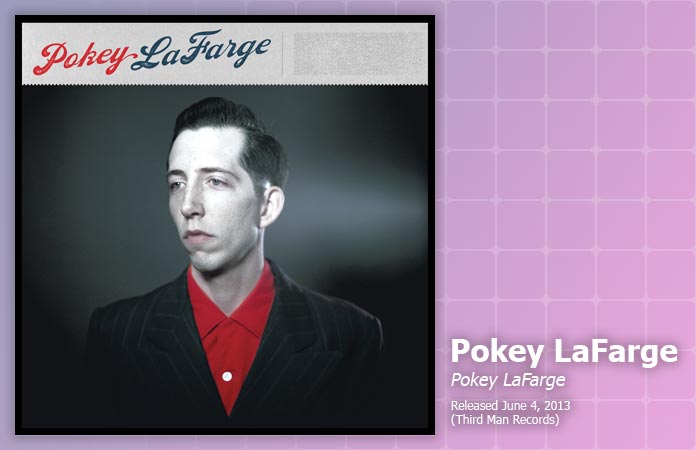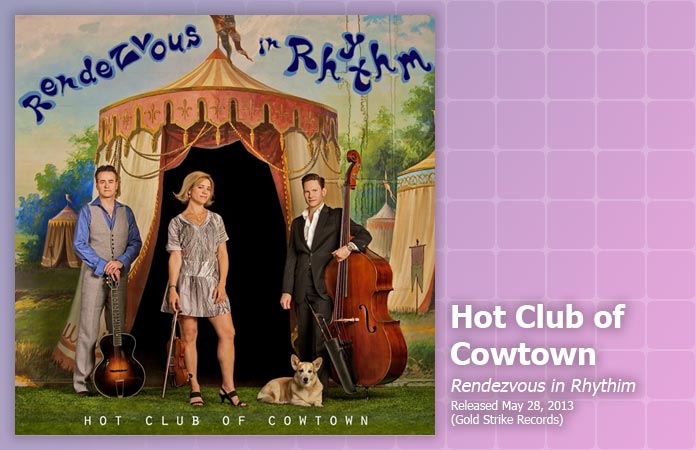Music Review: Preservation Hall Jazz Band, That’s It!
Published on July 9th, 2013 in: Current Faves, Music, Music Reviews, New Music Tuesday, Reviews |An important fact that not everyone knows is this: If a band has a tuba player in it, it is generally worth going to see live. This goes double for the Preservation Hall Jazz Band. The Preservation Hall Jazz Band was founded in 1961, dedicated to promoting traditional New Orleans jazz. Their new album That’s It! is their first album of entirely original music in their entire 50-year history. Produced by My Morning Jacket’s Jim James and Preservation Hall’s Creative Director, Ben Jaffe, That’s It! is an album of future standards.
Music Review: The Three O’Clock, The Hidden World Revealed
Published on July 2nd, 2013 in: Current Faves, Music, Music Reviews, New Music Tuesday, Retrovirus, Reviews |By Cait Brennan
“You like pop, right?”
The grizzled, ancient record clerk—god, he had to be at least 28!—leaned over the counter.
“What, like Phil Collins?” I asked. Oh, it’s 1984 in Phoenix, by the way.
“God, no, that’s like—bubblegum or something,” he coughed, like he ate a big black bug. “Here,” he flips through the in-store play copies and pulls out a record with some weird pasty kids making kissy faces under a dilapidated pagoda. This crazy sugar-crash stomp comes storming out of the store speakers, swirling keys and guitars ringing in my head like the bells of Notre-Dame. And then the singer, with a voice like none other: “sitting complacent, are you there where I see you, with a cantaloupe girlfriend . . .” What?!
“They’re the Three O’Clock, man,” says he. “A little twee for my taste, but I kinda figured you’d dig it.”
The clerk got my $4.98 and I got Baroque Hoedown, the first EP by the Three O’Clock. It’s at least 20 years later before I even begin to suspect what a cantaloupe girlfriend might be, but I dive headlong into this “paisley underground” thing, rifling through record bins until I have all their stuff, which at that time included their album released as The Salvation Army, and their full-length LP, Sixteen Tambourines. They would go on to release great albums on IRS and Prince’s Paisley Park records, but for me, their stuff on the brilliant Lisa Fancher’s Frontier Records is still the greatest.
Music Review: Dave Davies, I Will Be Me
Published on July 2nd, 2013 in: Current Faves, Music, Music Reviews, New Music Tuesday, Reviews |By Julie Finley
As a “lifer” in regards to being a Kinks fan, I felt that I should definitely review my childhood idol’s newest release, that idol being Dave Davies. I won’t give a history lesson on The Kinks (as there are enough online sources out there that could clue you in), but I do need to note that Dave’s relationship to his brother Ray has been well-documented as being unrestrained, to say the least. It is no mystery that Ray prefers that Dave live in his shadow, and that the competitive dysfunction between the two of them is one of the things that has led to both having a prolific output of work throughout both of their lives (even outside of The Kinks).
Quite honestly, though, Dave’s career is still often overlooked despite the fact he has been even more fruitful in his endeavors regarding the creation of new material. Ray hasn’t had that much solo material since The Kinks stopped recording in the mid-’90s, but the solo work he has put out is mostly rehashing his old catalogue with a few albums of brand new content. Dave has actually put out more original material than Ray since the ’90s! Yes, some of that has been re-releasing long-lost music that was never released as The Kinks, but the bulk of his output has been original material.
Music Review: Bosnian Rainbows, Bosnian Rainbows
Published on June 25th, 2013 in: Current Faves, Feminism, Music, Music Reviews, New Music Tuesday, Reviews |Remember the ’80s? Not the kitschified dayglo era of synthesizers and Patrick Nagel portraits, but the pre-Nirvana era of college radio, fly-by-night indie labels, and adventurous bands with eclectic influences. Bosnian Rainbows, a Latin alternative supergroup-of-sorts, exemplifies the magpie musical styles and willingness to experiment that made the previous generation’s proto-alternative bands so addictive.
Bosnian Rainbows trade in expansive, cinematic melodies, driven by curlicuing guitar riffs and strong arrangements. Omar Rodriguez-Lopez, the creative force behind the band, perfected these skills with his previous band, the Mars Volta. Reacting to what he saw as a dictatorial manner of producing and fronting a band, the guitarist opted for a more democratic experience with his next band.
Music Review: Piñata Protest, El Valiente
Published on June 18th, 2013 in: Current Faves, Music, Music Reviews, New Music Tuesday, Reviews |When I hit play on my demo copy of El Valiente, a series of brostep-style drops came out of my speakers. My heart sank. Had “los muy chingóns de Norteño Punk” gotten sidetracked by that most loathsome of EDM subgenres? One second and a long yip later, I realized I didn’t have to worry.
For the uninitiated, Piñata Protest has mastered a sound that blends the buzzing cacophony and shout-along choruses of punk with Norteño, an accordion-driven form of traditional Mexican music. While the two genres may seem at odds with one another, the fast tempos and slyly political lyrics for which Norteño is known play well with the exuberant energy of punk. It’s a wonder other bands haven’t tried this kind of you-got-your-peanut-butter-in-my-chocolate crossover.
Music Review: CSS, Planta
Published on June 11th, 2013 in: Current Faves, Feminism, Music, Music Reviews, New Music Tuesday, Reviews |Listening to the latest CSS album may inspire listeners to develop a vicarious crush on the object of the band’s affections. Washes of fizzy synths sound like the rush of dopamine one experiences while in the throes of infatuation, and the thumping, staccato rhythms pulse with exuberant energy.
Since their first album dropped in 2006, CSS have put their own spin on ’80s synth pop, investing the underrated genre with a sassy personality and a dollop of post-riot grrrl feminism. Compared to its predecessor, La Liberacion, Planta takes a more introspective lyrical approach, with songs that depict the giddy highs of falling in love and note the heartbreak of unrequited emotions. While the lyrics to individual songs might seem bratty and shallow, the album as a whole has such a desperate, obsessive quality that it comes off like the soundtrack to a film version of Orpheus and Eurydice as adapted by John Hughes.
Music Review: British Electric Foundation, Dark – Music Of Quality And Distinction, Volume 3
Published on June 11th, 2013 in: Music, Music Reviews, New Music Tuesday, Reviews |By Emily Carney
BEF’s first volumes were released in the halcyon days of white-boy soul, respectively in 1980 (Music for Stowaways, 1982—Volume 1) and 1991 (Volume 2). BEF’s excursions into the world of pop-music covers encompassed Tina Turner (who did a version of “Ball of Confusion” in 1982 which pretty much still blows everything out of the water) and Heaven 17’s Glenn Gregory covering Glen Campbell’s country chestnut “Wichita Lineman.” Oh yeah, this “collective” is also basically Heaven 17, now sans Human League founder and legendary disappear-er Ian Craig Marsh.
Now it’s 2013, and BEF is back with a set of new covers. Dark pretty much mines old material with the same players, including Kim Wilde (who covers “Every Time I See You I Go Wild”), Andy Bell from Erasure (who covers Kate Bush’s “Breathing”), and Boy George (who does The Stooges’ “I Wanna Be Your Dog”), among others. There are a few newer artists on the disc, including Shingai Shoniwa of the Noisettes (whose version of “God Only Knows” is a godsend), but I wish the disc included more new artists and perhaps newer songs.
Dark is essential for BEF and Heaven 17 completists, but those interested in being introduced to this family of music should check out 1981’s Penthouse and Pavement and 1982’s Music of Quality and Distinction Volume 1 which remain amazingly undated. While some of the versions of songs on Dark are standouts (Kim Wilde’s song contains all the electronics snaps and beeps we expect from BEF), don’t expect an epiphany here.
Dark, the British Electric Foundation’s third volume, is out today through The End Records. For ordering information, visit the BEF website.
Music Review: The Dudley Moore Trio, From Beyond The Fringe
Published on June 4th, 2013 in: Culture Shock, Current Faves, Music, Music Reviews, New Music Tuesday, Retrovirus, Reviews |By Cait Brennan
Dud, we hardly knew ye.
To Americans of a certain age, Dudley Moore was that loveable, “cuddly” Englishman of a certain height who improbably got the girl in several huge blockbusters of the ’70s and ’80s—notably Foul Play, 10, and Arthur (for which he received a well-deserved Oscar nomination). Even his less-successful films kept him firmly in the pop-culture consciousness throughout the ’80s—Wholly Moses, Micki and Maude, Best Defense, the Preston Sturges remake Unfaithfully Yours, Arthur 2: On The Rocks, Santa Claus: The Movie, the delightfully crass advertising send-up Crazy People.
Hits or flops, there’s something to love in all those films, and more importantly in his absolutely magnificent work in films like Stanley Donen’s Bedazzled; Bryan Forbes’s The Wrong Box; 30 Is A Dangerous Age, Cynthia; The Bed Sitting-Room; and so many others. But many of his film fans are only vaguely aware of Moore’s career as a highly regarded jazz composer and pianist, whose albums and film scores are every bit the equal of his comedy talent.
Music Review: Pokey LaFarge, Pokey LaFarge
Published on June 4th, 2013 in: Current Faves, Music, Music Reviews, New Music Tuesday, Reviews |Pokey LaFarge is a great addition to Jack White’s Third Man Records roster. His debut album for the label, Pokey LaFarge, is a rootsy, charming collection of tidy songs (only one is over four minutes long) that is terrifically listenable.
Music Review: Hot Club Of Cowton, Rendezvous In Rhythm
Published on May 28th, 2013 in: Music, Music Reviews, New Music Tuesday, Reviews |The cover drew me in.
The playful sleeve art for Rendezvous in Rhythm spoke to the part of me that loves flappers and circuses. I loved the hand painted, Belle Epoque-esque lettering, the trompe l’oeil circus tents, and the doleful corgi. The men and woman of Hot Club of Cowtown looked as though they’d stepped out of a 1930s musical, the gentlemen in natty suits and ties and the lady clad in a silver dress worthy of Clara Bow. Reading the description of the Hot Club’s sound put me in mind of my beloved Pink Martini, who has likewise reinvented early 20th century music for a contemporary audience, and I anticipated discovering a new band with a classic sound.









